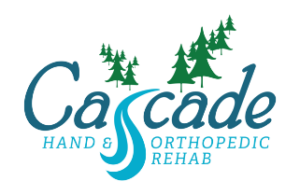Have you dislocated your finger? This is a pretty common injury that many people don’t even realize they’ve sustained until symptoms become severe. Your finger might seem a little bent or crooked, and it may hurt to move it.
The good news is that a licensed hand therapist at Cascade Hand & Orthopedic Rehab in Fort Myers, FL may be able to help you find relief! Schedule an appointment at our clinic today and get back to using your hands without experiencing painful symptoms.

How does a finger become dislocated?
Finger dislocation is a common injury. It occurs when the bones of the finger are moved (dislocated) from their normal position. A dislocated finger can occur in any of the joints of any finger, but it occurs most often in the middle knuckle (PIP joint) of a finger.
The most common causes of finger dislocations are sports or falls when the finger is twisted, bent or pushed backward forcefully. An object such as a ball hitting the finger can also cause the finger to dislocate.
Types of finger dislocations
Types of dislocations are called dorsal, volar or lateral depending on the direction of the dislocated bone. There can be a fracture associated with a dislocation and also the ligaments surrounding the joint can be sprained or torn.
What are the symptoms of a finger dislocation?
A dislocated finger is usually obvious, but not always. The finger may appear crooked or bent and can be painful, swollen, bruised and difficult to move. There may be numbness or tingling and the finger may have a pale color. Some dislocations may cause the skin to tear.
What is the treatment for a finger dislocation?
The majority of finger dislocations are treatable without surgery. X-rays and a physical examination may be required. “Putting the finger back in place” is usually the treatment (reduction).
The finger is usually then rested in an orthotic or buddy taped to its neighbor. Early exercise to bend the finger is generally begun once the finger is safe to be moved. If the dislocation is combined with a fracture and is not stable, surgery might be required.
Hand therapy for finger dislocations
A hand therapist works with the patient in order to achieve the best possible outcome after a finger dislocation.
A hand therapist in Fort Myers, FL may fabricate a custom orthosis to protect the finger as it heals. Regaining the movement and strength of the hand will be a focus of treatment. Other focuses will include occupational therapy to help you return to doing everyday tasks (writing, getting dressed, brushing teeth) without pain.
Your Next Steps…
Request An Appointment
Receive A Custom Treatment Plan
Work Hard and Progress In Your Recovery
Recover & Enjoy Life Pain-Free!

